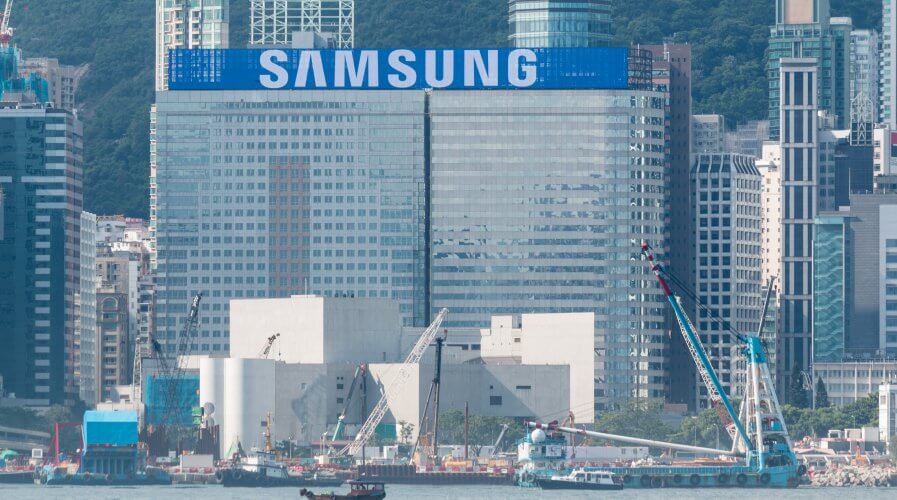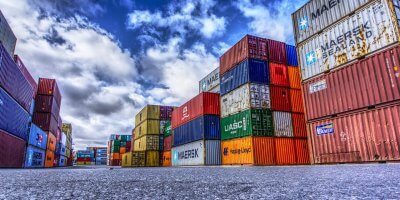
The Korean manufacturer may be the first to leverage blockchain for its supply chain. Source: Shutterstock
Samsung to use blockchain to reduce shipping costs by 20pc
EVERY business executive and leader has read about blockchains and how they can help companies around the world make their ledgers (and operations) more transparent and secure. However, not many have been able to take the idea of the blockchain and apply it to solve real-world problems.
Samsung, fortunately, is here to show us how businesses can transform their supply chain and logistics operations using blockchain – and save 20 percent in shipping costs in the bargain.
According to Bloomberg, the Korean technology giant might soon use the blockchain to manage its global supply chain network.
Samsung Electronics Co. is considering a blockchain ledger system to keep track of global shipments worth tens of billion of dollars a year, according to Song Kwang-woo, the blockchain chief at Samsung SDS Co., the group’s logistical and information and technology arm. The system could cut shipping costs by 20 percent, according to SDS, reported Bloomberg.
If Samsung does achieve the cost savings and the scale with its blockchain-powered supply chain project, Gartner’s projections of the business value of the technology become even more realistic.
In March last year, the firm estimated that the “business value-add” of blockchain will grow to slightly more than $176 billion by 2025, and then it will exceed $3.1 trillion by 2030. Business value-add, according to the analytics firm, is quantified by the value of the technology innovation rather than the dollars spent on it.
Last month, Accenture partnered with AB InBev, APL, and Kuehne + Nagel to demonstrate how blockchain will create huge efficiencies for the industry.
Accenture and its partners tested a solution where documents are no longer exchanged physically or digitally but instead, the relevant data is shared and distributed using blockchain technology under single ownership principles determined by the type of information.
Through a detailed review of the current documentation processes, the group examined a re-allocation of information ownership, accountability, and risk enabled by the trust and security blockchain technology offers.
An international shipment of goods for companies in areas such as the automotive, retail or consumer goods industries typically requires more than 20 different documents, many of which are often paper-based, to enable the goods to move from exporter to importer.
Across these documents, up to 70 percent of the data can be replicated. The document heavy approach limits data quality and real-time visibility to all parties involved in the trade and this can also delay the financial settlement on goods.
The solution developed by Accenture and its partners speeds up the entire flow of transport documents, reduces the requirement for data entry by up to 80 percent, simplifies data amendments across the shipping process, streamlines the checks required for cargo, and reduces the burden and risk of penalties for customs compliance levied on customers.
Speaking of Samsung’s implementation of blockchain in its supply chain network, Bloomberg mentioned that SDS expects to handle 488,000 tons of air cargo and 1 million 20-foot-equivalent (TEU) shipping units this year. That would include organic light-emitting diode displays and Galaxy S9 phones made by Samsung Electronics.
“A blockchain system may help the company reduce the time lag between product launches and actual shipments, making it easier to respond to rival products and shifting consumer appetites in emerging markets like China,” Cheong Tae-su, Professor of Industrial Engineering at Korea University in Seoul told Bloomberg.
According to the International Data Corporation (IDC), global spending on blockchain solutions is forecast to reach US$2.1 billion in 2018, more than double the US$945 million spent in 2017. In 2021 annual spending is expected to reach US$9.7 billion. From the looks of it, shipping and logistics might be one of the top-grossing solutions in the near future.
READ MORE
- Strategies for Democratizing GenAI
- The criticality of endpoint management in cybersecurity and operations
- Ethical AI: The renewed importance of safeguarding data and customer privacy in Generative AI applications
- How Japan balances AI-driven opportunities with cybersecurity needs
- Deploying SASE: Benchmarking your approach




